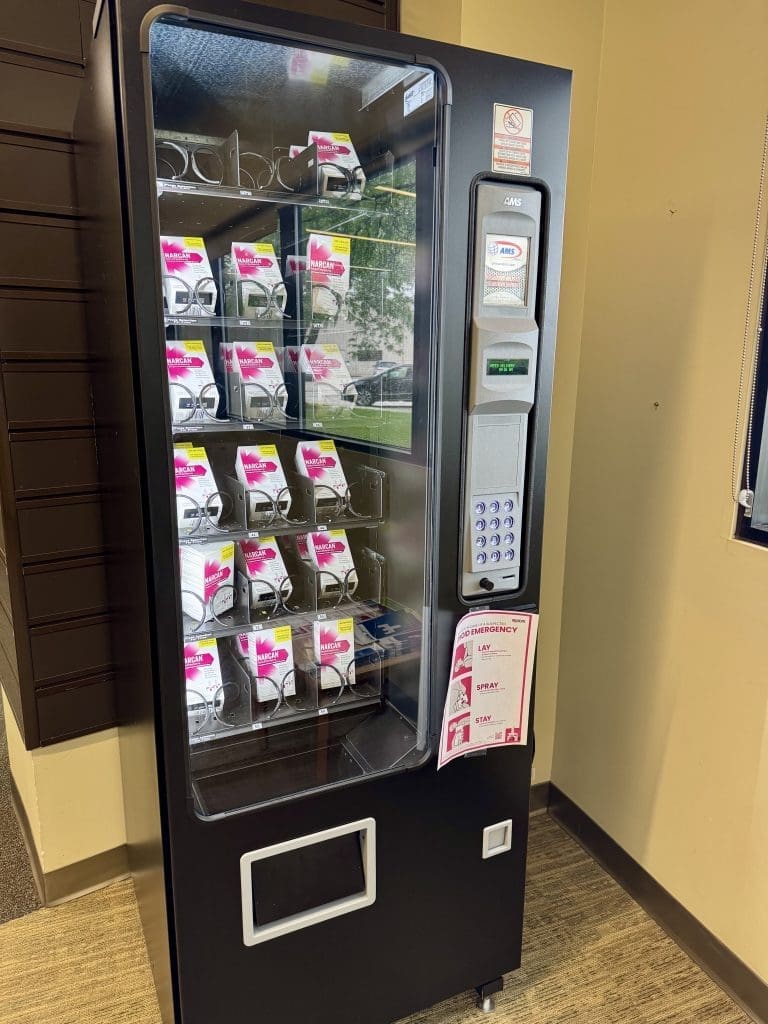University of Michigan Health-West has installed a new naloxone vending machine at its Community Clinic, located at 781 36th Street SE in Wyoming, thanks to a statewide initiative aimed at reducing preventable opioid overdose deaths. Provided by the Overdose Prevention Engagement Network (OPEN), the vending machine offers free access to naloxone, a medication that can rapidly reverse opioid overdoses, available without a prescription to patients, visitors and members of the public.
The naloxone dispenser is in the clinic’s shared waiting area, which also serves patients of the adjacent Catherine’s Health Center Dental Clinic. This placement was intentionally chosen to provide discreet and stigma-free access to this critical medication.
“This is about making sure people in our community have access to the tools they need to save a life,” said Margo Schlewitz, manager of the UM Health-West Community Health Center. “Naloxone is simple to use and proven to reverse opioid overdoses. By offering it free, without barriers, we’re empowering people to respond quickly in a crisis and showing that every life matters.”
The UM Health-West Community Clinic is a lifeline for many who might not otherwise have access to care. In 2024, the clinic recorded nearly 18,000 visits, serving patients from across West Michigan. Many of those who walk through the doors face real barriers when it comes to affording or accessing healthcare. About 41 percent of patients are covered by Medicaid, while more than a quarter have no insurance at all. Another 20 percent rely on Medicare, and just 13 percent have commercial insurance.
The clinic is also a reflection of the community it serves. Patients come from a wide range of backgrounds: 37 percent identify as white, 36 percent as Black, and 7 percent as Asian, with others identifying as multiracial. Women make up the majority of those seen, about 65 percent of all visits last year.
Services at the clinic are designed to meet a wide range of needs: family medicine, internal medicine, OB/GYN, maternal-infant health, urology, and osteopathic manipulative medicine. Patients also have access to diabetes care, imaging and radiology, orthopedic services and surgical care. The clinic also offers an emergency food pantry and specialized programs for at-risk mothers, helping patients not just get healthy, but stay healthy.
Naloxone kits will be ordered through the Michigan Department of Health and Human Services at no cost, ensuring a consistent supply. Distribution data will be reported back to the state to help evaluate the program’s impact.
“This initiative aligns closely with our mission to prevent harm and provide compassionate, equitable care to all,” said Rachel Walter, clinical pharmacist with the UM Health-West Clinically Integrated Network. “Expanding access to naloxone allows us to better serve our neighbors, reduce stigma, and offer hope in moments of crisis.”
OPEN’s naloxone distribution program partners with healthcare providers and community organizations across Michigan to place vending machines and distribution boxes in locations where they are most needed.

The new naloxone vending machine at UM Health-West Community Clinic in Wyoming, pictured Aug. 12, 2025, provides free, no-prescription access to the lifesaving overdose-reversal medication.